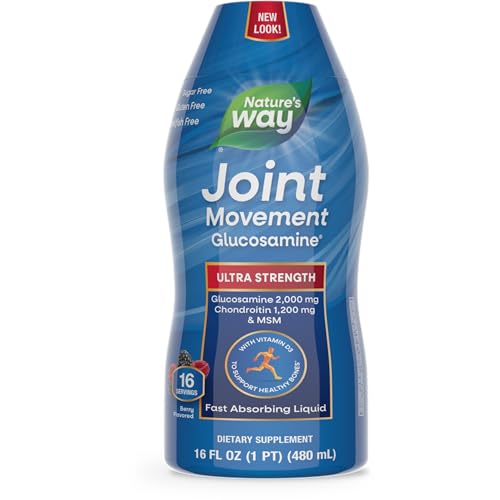
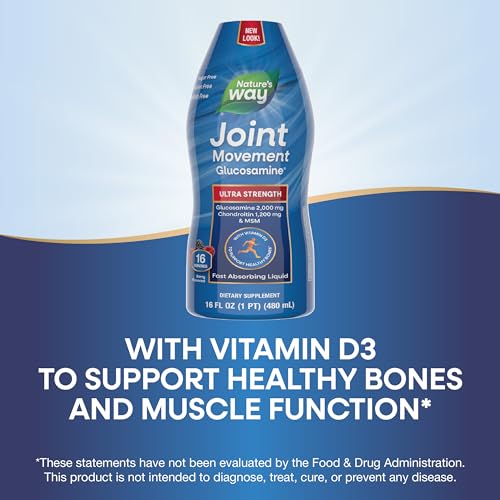
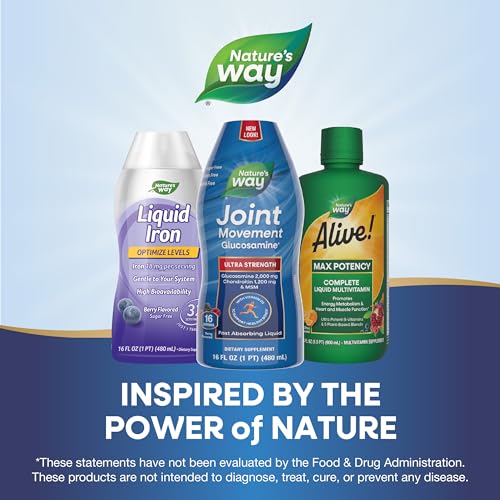
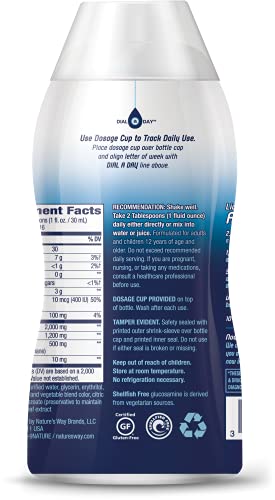
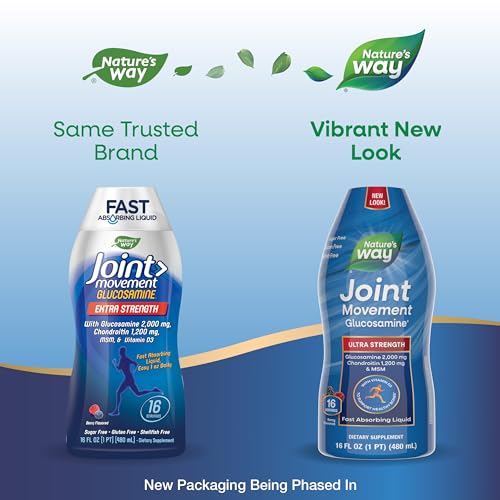
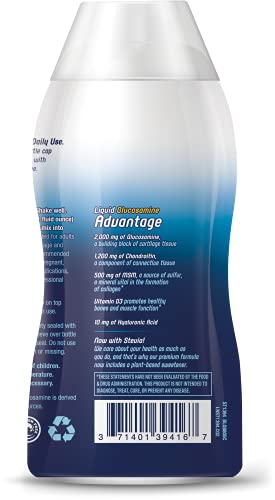
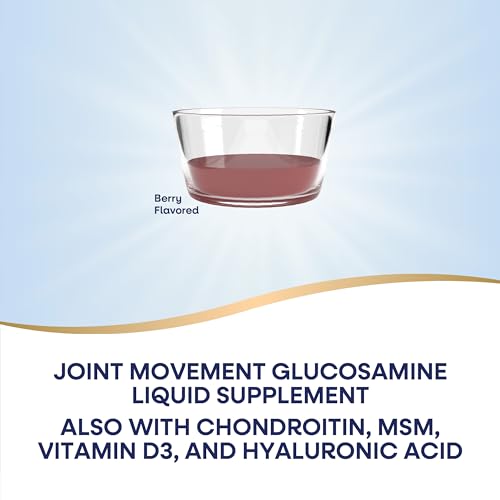
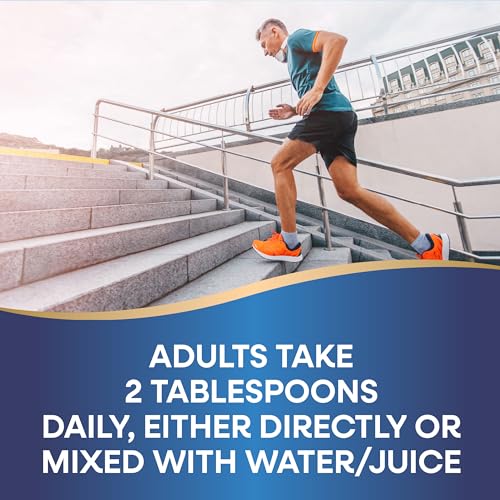
Nature's Way Joint Movement Liquid - Ultra Strength Pain Relief, Supports Healthy Bones - 16 Fl Oz


Vitamin D3
High RiskVitamin D3, also known as cholecalciferol, is a fat-soluble vitamin important for calcium metabolism and bone health. It is synthesized in the skin upon exposure to sunlight and is also found in some foods and supplements. Its primary function is to promote the absorption of calcium and phosphorus in the body.
Sustai Insights
Vitamin D3 offers functional benefits such as supporting bone health and immune function. However, excessive intake can lead to toxicity, presenting risks like hypercalcemia. Environmental concerns include its potential for bioaccumulation. Regulatory bodies impose usage restrictions due to these risks, resulting in a high overall risk assessment. Safe usage practices should be observed, and alternatives such as vitamin D2 may be considered.
Citric Acid
Medium RiskCitric acid is an alpha hydroxy acid used in personal care products primarily for its role as a pH adjuster and natural preservative. It occurs naturally in citrus fruits and is commonly utilized in various formulations for its chelating properties and mild exfoliation benefits.
Sustai Insights
Citric acid offers functional benefits as an effective preservative and pH stabilizer, contributing to product longevity and stability. It is biodegradable and derived from renewable sources. Health risks are low, with minimal concerns regarding carcinogenicity, allergies, and reproductive toxicity. However, moderate use restrictions exist due to potential irritation at high concentrations. Environmental risks are limited, as citric acid is not known to accumulate in ecosystems. Regulatory agencies have no significant advisories against its use. Overall, it is assessed as a medium-risk ingredient, with safe usage practices recommended and alternatives available.
Dimethyl Sulfone
Low RiskDimethyl sulfone, also known as MSM, is a naturally occurring organic sulfur compound often used in dietary supplements and cosmetics for its purported benefits in joint health and as a skin conditioning agent. It is generally recognized for its role in enhancing the absorption of other ingredients and providing a source of sulfur.
Sustai Insights
Dimethyl sulfone is recognized for its functional benefits, including potential anti-inflammatory properties and support for joint health. It is generally considered safe, with low concerns for carcinogenicity, allergies, or reproductive toxicity. Environmental impact assessments indicate low pollutant potential and no bioaccumulation. Regulatory bodies have not imposed restrictions, highlighting its favorable safety profile. Overall, the ingredient poses low risk, making it a viable option in formulations, with no immediate safer alternatives noted.
Hyaluronic Acid
Low RiskHyaluronic acid is a natural polysaccharide found in connective tissues, skin, and cartilage, primarily serving as a moisture-retaining agent in cosmetic products. Its primary function is to provide hydration and improve skin elasticity, making it a common ingredient in moisturizers and serums.
Sustai Insights
Hyaluronic acid offers significant functional benefits, such as effective hydration and skin plumping, while being biodegradable and generally recognized as safe by regulatory bodies. Health risks are minimal, with low concerns regarding carcinogenicity, allergies, or reproductive toxicity. Environmental risks are also low, as it is not considered a pollutant or bioaccumulative. Regulatory bodies have not issued major advisories against its use, resulting in an overall low-risk assessment. For safe usage, it is recommended to apply in appropriate concentrations. Alternatives include glycerin or aloe vera, which also provide hydration.
Sucralose
Low RiskSucralose is a chlorinated derivative of sucrose, commonly used as a non-caloric sweetener in various food and beverage products. It is approximately 600 times sweeter than sugar and is stable under heat, making it suitable for cooking and baking applications.
Sustai Insights
Sucralose offers functional benefits as an effective sweetener without contributing calories, making it a popular choice in diet products. It is generally considered safe, with low concerns regarding carcinogenicity, allergies, and reproductive toxicity. However, it has moderate persistence and bioaccumulation potential in the environment. Regulatory bodies like the FDA approve its use, with no significant advisories. Overall, it poses a low risk to health and the environment, with safe usage practices supporting its incorporation in various products.
Glucosamine Hcl
Low RiskGlucosamine HCl is an amine salt derived from glucose, commonly used in dietary supplements and topical products for its potential role in promoting joint health and supporting cartilage maintenance.
Sustai Insights
Glucosamine HCl offers functional benefits in supporting joint health and is typically considered safe with low risks for carcinogenicity, allergies, and reproductive toxicity. It is not currently restricted by regulatory bodies. However, exposure might pose minimal health risks for certain individuals, and environmental concerns are negligible, contributing to a low overall risk assessment. Safe usage practices include adhering to recommended dosages. Alternatives such as chondroitin sulfate or turmeric may provide similar benefits with different profiles.
Sodium
Low RiskSodium is a chemical element commonly used in various products, primarily as a preservative and stabilizing agent. It is involved in numerous reactions, contributing to the overall functionality and safety of formulations.
Sustai Insights
Sodium serves as an effective preservative, helping to extend product shelf life. It is generally recognized as safe with low concerns for carcinogenicity, allergies, and reproductive toxicity. However, excessive exposure may lead to health issues like hypertension. Environmentally, sodium is considered low risk regarding pollution and bioaccumulation. Regulatory bodies have not imposed significant restrictions on its use. Overall, the risk associated with sodium is low, making it a suitable ingredient with no major health or environmental concerns.
Chondroitin Sulfate
Low RiskChondroitin sulfate is a naturally occurring substance found in cartilage. It is commonly used as a dietary supplement for joint health and is often included in products formulated to support joint function and mobility.
Sustai Insights
Chondroitin sulfate serves as a beneficial component for joint health, exhibiting functional advantages such as promoting cartilage elasticity and reducing inflammation. It is generally recognized as safe with low risks for carcinogenicity, allergies, and reproductive toxicity. Environmental concerns are minimal, with no significant pollutant or bioaccumulation potential. Regulatory bodies have not placed restrictions on its use, affirming its safety profile. Overall, the risk level associated with chondroitin sulfate is low. For those seeking alternatives, glucosamine may serve as a complementary option for joint support.
Potassium Benzoate
Low RiskPotassium benzoate is a potassium salt of benzoic acid, commonly used as a preservative in food and cosmetic products. It prevents microbial growth and extends shelf life, making it a popular choice in formulations requiring stability and safety against spoilage.
Sustai Insights
Potassium benzoate serves effectively as a preservative, helping to maintain product integrity. It is considered low risk regarding cancer, allergies, and reproductive toxicity, with no significant environmental concerns noted. Regulatory bodies have imposed minimal restrictions on its use. Safe practices recommend adhering to established concentration thresholds. Alternatives include sodium benzoate, which may offer similar benefits with comparable safety profiles. Overall, the ingredient is assessed as low risk.
Erythritol
Low RiskErythritol is a sugar alcohol used primarily as a low-calorie sweetener in various food and beverage products. It occurs naturally in some fruits and fermented foods. Erythritol provides sweetness without significant calories or raising blood glucose levels, making it a popular alternative to traditional sugars.
Sustai Insights
Erythritol offers functional benefits as a sweetener with low caloric content, providing a suitable option for sugar reduction. It is considered safe with low concerns regarding carcinogenicity, allergies, and reproductive toxicity. Environmentally, it is not recognized as a significant pollutant nor does it bioaccumulate. Regulatory status is favorable, with no current restrictions. Overall, the ingredient presents a low risk, making it a viable option for consumers seeking healthier alternatives.
Sodium Edta
Low RiskSodium EDTA is a chelating agent commonly used in cosmetic and personal care products to bind metal ions, enhancing product stability and preventing degradation. It helps improve the efficacy of preservatives and can enhance the overall texture of formulations.
Sustai Insights
Sodium EDTA is effective in stabilizing formulations and preventing metal ion interference, contributing positively to product performance. It is considered low risk for health concerns such as carcinogenicity, allergies, and reproductive toxicity. Environmentally, it poses minimal risks, with no significant bioaccumulation or pollution potential. Regulatory bodies have not imposed major restrictions, reflecting its favorable profile. Safe usage levels are established, reinforcing its low-risk status overall. Alternatives like natural chelating agents exist but may not match its performance, thus maintaining sodium EDTA as a viable option for many formulations.
Vitamin D3
High RiskVitamin D3, also known as cholecalciferol, is a fat-soluble vitamin important for calcium metabolism and bone health. It is synthesized in the skin upon exposure to sunlight and is also found in some foods and supplements. Its primary function is to promote the absorption of calcium and phosphorus in the body.
Sustai Insights
Vitamin D3 offers functional benefits such as supporting bone health and immune function. However, excessive intake can lead to toxicity, presenting risks like hypercalcemia. Environmental concerns include its potential for bioaccumulation. Regulatory bodies impose usage restrictions due to these risks, resulting in a high overall risk assessment. Safe usage practices should be observed, and alternatives such as vitamin D2 may be considered.
Dimethyl Sulfone
Low RiskDimethyl sulfone, also known as MSM, is a naturally occurring organic sulfur compound often used in dietary supplements and cosmetics for its purported benefits in joint health and as a skin conditioning agent. It is generally recognized for its role in enhancing the absorption of other ingredients and providing a source of sulfur.
Sustai Insights
Dimethyl sulfone is recognized for its functional benefits, including potential anti-inflammatory properties and support for joint health. It is generally considered safe, with low concerns for carcinogenicity, allergies, or reproductive toxicity. Environmental impact assessments indicate low pollutant potential and no bioaccumulation. Regulatory bodies have not imposed restrictions, highlighting its favorable safety profile. Overall, the ingredient poses low risk, making it a viable option in formulations, with no immediate safer alternatives noted.
Hyaluronic Acid
Low RiskHyaluronic acid is a natural polysaccharide found in connective tissues, skin, and cartilage, primarily serving as a moisture-retaining agent in cosmetic products. Its primary function is to provide hydration and improve skin elasticity, making it a common ingredient in moisturizers and serums.
Sustai Insights
Hyaluronic acid offers significant functional benefits, such as effective hydration and skin plumping, while being biodegradable and generally recognized as safe by regulatory bodies. Health risks are minimal, with low concerns regarding carcinogenicity, allergies, or reproductive toxicity. Environmental risks are also low, as it is not considered a pollutant or bioaccumulative. Regulatory bodies have not issued major advisories against its use, resulting in an overall low-risk assessment. For safe usage, it is recommended to apply in appropriate concentrations. Alternatives include glycerin or aloe vera, which also provide hydration.
Citric Acid
Medium RiskCitric acid is an alpha hydroxy acid used in personal care products primarily for its role as a pH adjuster and natural preservative. It occurs naturally in citrus fruits and is commonly utilized in various formulations for its chelating properties and mild exfoliation benefits.
Sustai Insights
Citric acid offers functional benefits as an effective preservative and pH stabilizer, contributing to product longevity and stability. It is biodegradable and derived from renewable sources. Health risks are low, with minimal concerns regarding carcinogenicity, allergies, and reproductive toxicity. However, moderate use restrictions exist due to potential irritation at high concentrations. Environmental risks are limited, as citric acid is not known to accumulate in ecosystems. Regulatory agencies have no significant advisories against its use. Overall, it is assessed as a medium-risk ingredient, with safe usage practices recommended and alternatives available.
Sucralose
Low RiskSucralose is a chlorinated derivative of sucrose, commonly used as a non-caloric sweetener in various food and beverage products. It is approximately 600 times sweeter than sugar and is stable under heat, making it suitable for cooking and baking applications.
Sustai Insights
Sucralose offers functional benefits as an effective sweetener without contributing calories, making it a popular choice in diet products. It is generally considered safe, with low concerns regarding carcinogenicity, allergies, and reproductive toxicity. However, it has moderate persistence and bioaccumulation potential in the environment. Regulatory bodies like the FDA approve its use, with no significant advisories. Overall, it poses a low risk to health and the environment, with safe usage practices supporting its incorporation in various products.
Glucosamine Hcl
Low RiskGlucosamine HCl is an amine salt derived from glucose, commonly used in dietary supplements and topical products for its potential role in promoting joint health and supporting cartilage maintenance.
Sustai Insights
Glucosamine HCl offers functional benefits in supporting joint health and is typically considered safe with low risks for carcinogenicity, allergies, and reproductive toxicity. It is not currently restricted by regulatory bodies. However, exposure might pose minimal health risks for certain individuals, and environmental concerns are negligible, contributing to a low overall risk assessment. Safe usage practices include adhering to recommended dosages. Alternatives such as chondroitin sulfate or turmeric may provide similar benefits with different profiles.
Sodium
Low RiskSodium is a chemical element commonly used in various products, primarily as a preservative and stabilizing agent. It is involved in numerous reactions, contributing to the overall functionality and safety of formulations.
Sustai Insights
Sodium serves as an effective preservative, helping to extend product shelf life. It is generally recognized as safe with low concerns for carcinogenicity, allergies, and reproductive toxicity. However, excessive exposure may lead to health issues like hypertension. Environmentally, sodium is considered low risk regarding pollution and bioaccumulation. Regulatory bodies have not imposed significant restrictions on its use. Overall, the risk associated with sodium is low, making it a suitable ingredient with no major health or environmental concerns.
Chondroitin Sulfate
Low RiskChondroitin sulfate is a naturally occurring substance found in cartilage. It is commonly used as a dietary supplement for joint health and is often included in products formulated to support joint function and mobility.
Sustai Insights
Chondroitin sulfate serves as a beneficial component for joint health, exhibiting functional advantages such as promoting cartilage elasticity and reducing inflammation. It is generally recognized as safe with low risks for carcinogenicity, allergies, and reproductive toxicity. Environmental concerns are minimal, with no significant pollutant or bioaccumulation potential. Regulatory bodies have not placed restrictions on its use, affirming its safety profile. Overall, the risk level associated with chondroitin sulfate is low. For those seeking alternatives, glucosamine may serve as a complementary option for joint support.
Potassium Benzoate
Low RiskPotassium benzoate is a potassium salt of benzoic acid, commonly used as a preservative in food and cosmetic products. It prevents microbial growth and extends shelf life, making it a popular choice in formulations requiring stability and safety against spoilage.
Sustai Insights
Potassium benzoate serves effectively as a preservative, helping to maintain product integrity. It is considered low risk regarding cancer, allergies, and reproductive toxicity, with no significant environmental concerns noted. Regulatory bodies have imposed minimal restrictions on its use. Safe practices recommend adhering to established concentration thresholds. Alternatives include sodium benzoate, which may offer similar benefits with comparable safety profiles. Overall, the ingredient is assessed as low risk.
Erythritol
Low RiskErythritol is a sugar alcohol used primarily as a low-calorie sweetener in various food and beverage products. It occurs naturally in some fruits and fermented foods. Erythritol provides sweetness without significant calories or raising blood glucose levels, making it a popular alternative to traditional sugars.
Sustai Insights
Erythritol offers functional benefits as a sweetener with low caloric content, providing a suitable option for sugar reduction. It is considered safe with low concerns regarding carcinogenicity, allergies, and reproductive toxicity. Environmentally, it is not recognized as a significant pollutant nor does it bioaccumulate. Regulatory status is favorable, with no current restrictions. Overall, the ingredient presents a low risk, making it a viable option for consumers seeking healthier alternatives.
Sodium Edta
Low RiskSodium EDTA is a chelating agent commonly used in cosmetic and personal care products to bind metal ions, enhancing product stability and preventing degradation. It helps improve the efficacy of preservatives and can enhance the overall texture of formulations.
Sustai Insights
Sodium EDTA is effective in stabilizing formulations and preventing metal ion interference, contributing positively to product performance. It is considered low risk for health concerns such as carcinogenicity, allergies, and reproductive toxicity. Environmentally, it poses minimal risks, with no significant bioaccumulation or pollution potential. Regulatory bodies have not imposed major restrictions, reflecting its favorable profile. Safe usage levels are established, reinforcing its low-risk status overall. Alternatives like natural chelating agents exist but may not match its performance, thus maintaining sodium EDTA as a viable option for many formulations.
Discover Nature's Way Joint Movement Glucosamine, a fast-absorbing liquid designed to support joint health and muscle function. This ultra-strength formula blends 2,000 mg glucosamine, 1,200 mg chondroitin, and 500 mg MSM with vitamin D3, providing essential nutrients for healthy bones and mobility.*
- Enhanced Joint Support: This supplement helps maintain cartilage and connective tissue, promoting overall joint health.*
- Fast Absorption: The liquid form ensures quick absorption, allowing for immediate benefits and easy integration into your daily routine.*
- Delicious Flavor: Enjoy the refreshing berry flavor, making it simple to take your daily dose, either on its own or mixed with beverages.*
- Certified Quality: This product is gluten-free, sugar-free, and shellfish-free, meeting the needs of health-conscious consumers.*
- Commitment to Wellness: Nature’s Way has over 50 years of expertise in natural health solutions, ensuring you receive quality supplements that prioritize your well-being.*
Subscribe & Save with Sustai
- Best Price Guarantee: Always enjoy the lowest prices on sustainable home essentials.
- No Surprises: We’ll notify you before shipping. No hidden fees, ever.
- You’re in Charge: Change, pause, or cancel your subscription anytime with ease.
- Eco-Friendly Deliveries: Our grouped shipments mean less packaging and lower emissions.
Join us on a sustainable journey. Special offers for a limited time! Prices and promotions may change.
Recommended Products
Discover Nature's Way Joint Movement Glucosamine, a fast-absorbing liquid designed to support joint health and muscle function. This ultra-strength formula blends 2,000 mg glucosamine, 1,200 mg chondroitin, and 500 mg MSM with vitamin D3, providing essential nutrients for healthy bones and mobility.*
- Enhanced Joint Support: This supplement helps maintain cartilage and connective tissue, promoting overall joint health.*
- Fast Absorption: The liquid form ensures quick absorption, allowing for immediate benefits and easy integration into your daily routine.*
- Delicious Flavor: Enjoy the refreshing berry flavor, making it simple to take your daily dose, either on its own or mixed with beverages.*
- Certified Quality: This product is gluten-free, sugar-free, and shellfish-free, meeting the needs of health-conscious consumers.*
- Commitment to Wellness: Nature’s Way has over 50 years of expertise in natural health solutions, ensuring you receive quality supplements that prioritize your well-being.*

You can have at most 2 Sustainable Steals products in your cart
Customer Reviews
Customers’ View
Customers generally appreciate the effectiveness and convenience of the Joint Support Supplement, highlighting its ability to alleviate joint pain and enhance mobility. Many users report significant relief from discomfort, with some noting rapid results, stating that the liquid form absorbs quickly compared to traditional pills. The product's ease of use is frequently mentioned, as customers favor the liquid format over larger tablets. While opinions on the taste vary, most agree that the berry flavor is tolerable. Additionally, the product's clean formulation, being gluten-free and sugar-free, resonates well with health-conscious consumers. Overall, feedback indicates that users find this supplement beneficial for maintaining joint health and supporting an active lifestyle.
AI-generated from the text of customer reviewsThis product is rated 4.5 of 5.0 stars.
It has received 33 reviews.




